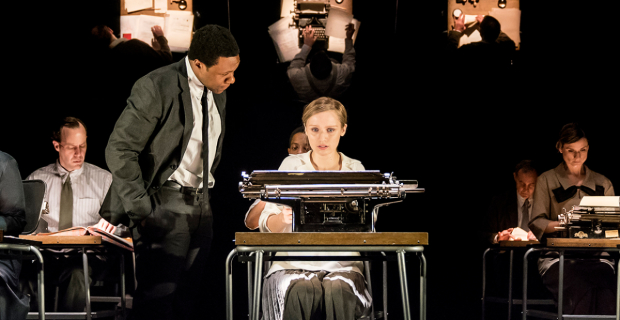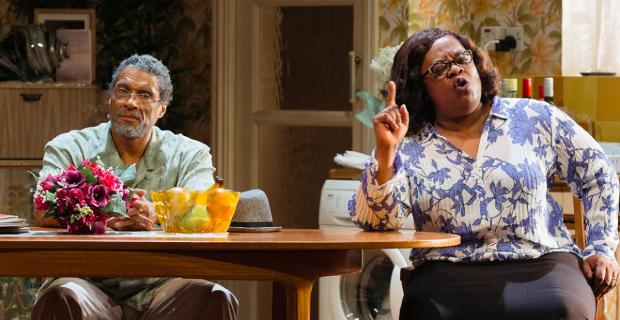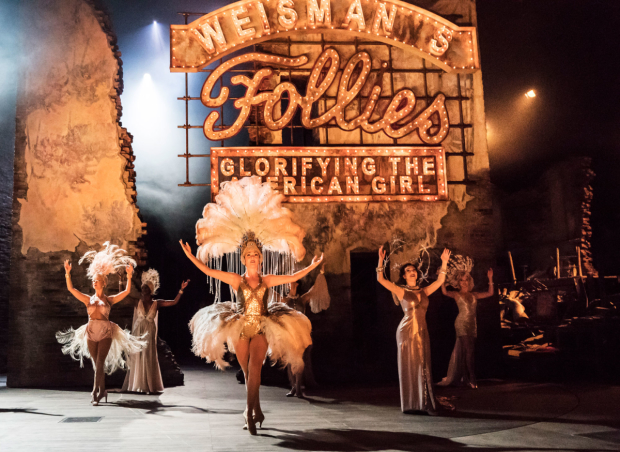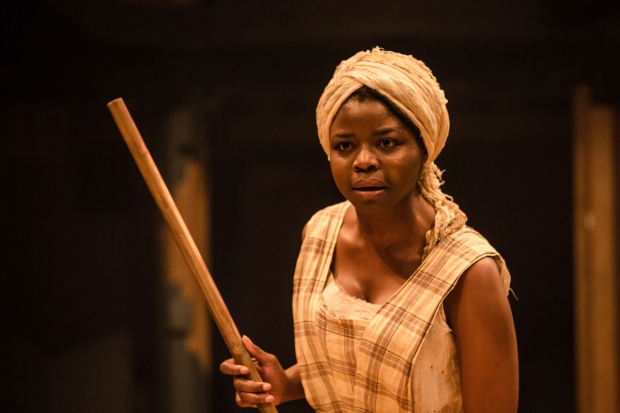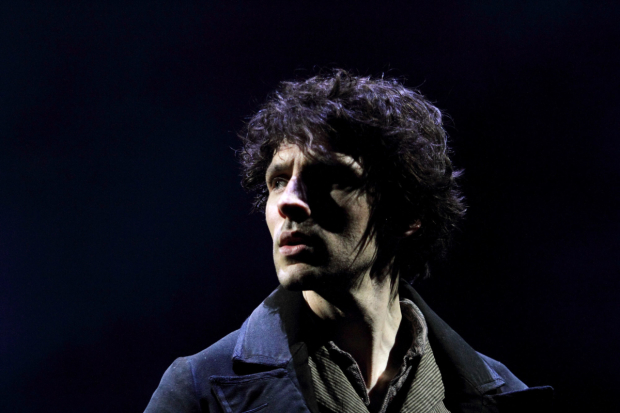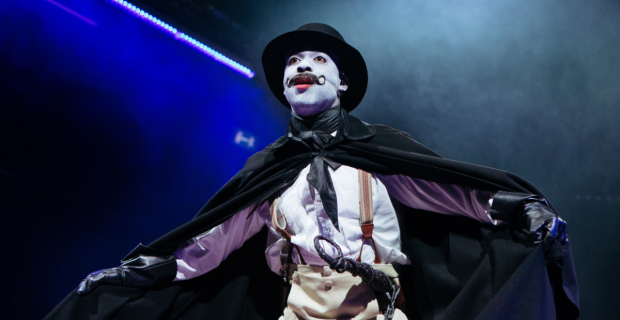Ned Bennett and Branden Jacobs-Jenkins: interview on An Octoroon
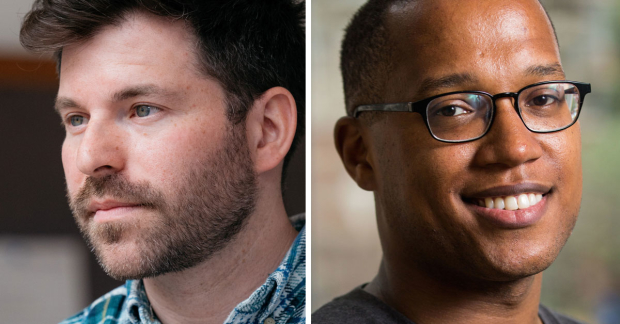
© Right: Helen Murray; left: Macarthur
Ned Bennett directed Branden Jacobs-Jenkins' remarkable play An Octoroon at the Orange Tree theatre last year, to all-round excellent reviews. The knotty, form-busting piece is a riff on The Octoroon by the 19th century play by Irish actor and writer Dion Boucicault. The original play is set in southern America on a plantation and tells intertwining stories of both slaves and slave owners. Jacobs-Jenkins re-imagines the piece with his play An Octoroon, framing it with the scenario of a black playwright, who decides to stage the play himself, as no white actors would take on roles which are now seen as racist. Now, the piece has opened at the National Theatre, which is not the first time Bennett has transferred provocative and taxing work from the Orange Tree to the National Theatre. His production of Pomona played in the temporary theatre in 2015. An Octoroon is the first time that a play by the Pulitzer Prize nominated Jacobs-Jenkins – currently on attachment at the National and only recently discovered by UK audiences – will be seen at the theatre. It's entirely sold out, but there are always day tickets available and Friday Rush tickets too. Here, we talk to both director and writer about the piece, UK/US audiences and how they deal with reviews.
How did you come to write An Octoroon?
Branden Jacobs-Jenkins: The Octoroon, by Dion Boucicault, was a play I encountered again and again in various academic contexts. I was first exposed to it as an undergraduate. For some reason it was a play I thought about all the time. It obsessed me. It never occurred to me to adapt it… I just really wanted to see this weirdly bizarre, offensive, but brilliant piece of theatre onstage. It was good writing, the machine of [that play] is amazing. But I realised no one was going to do that and that I would maybe have to do it myself.
So you would describe it as an adaptation?
BJJ: It sort of is, but I actually have to own the fact that now it's maybe something else. It moves through adaptation into its own thing. That's something I've only recently dealt with. Weirdly the whole play does exist inside it. But it winds up being a deeper meditation on history and what you do with history.
Have you changed anything for the National Theatre transfer?
BJJ: We've expanded things, added layers. Out starting point was more confident having done the play already. The Orange Tree is incredible, [the people there] make everything happen, but then you come [to the National Theatre] and there's more resources to see ideas through.
Ned Bennett: We had a costume fitting the day before rehearsals and five different people came in to do the wig, the headdress and to refit something. At the Orange Tree it was everyone getting involved and stuck in.
BJJ: Yes at the National they have about 15 trillion people running around!
Ned, you staged Pomona at the Temporary Theatre, what's it like working at the Dorfman? Does it feel very different?
NB: Yes, and it feels like the play works better in a bigger space. These plays [melodramas] have big broad tableaux, because they were done in places like Drury Lane so we've scaled it up. It's still in the round. The Dorfman is a bit of a dream venue to take it to.
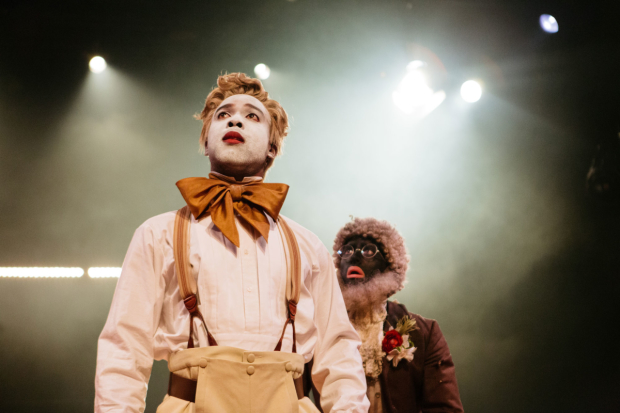
© Helen Murray 2018
Was it hard getting the play on over here?
BJJ: My experience for so long was people saying: 'It's too American', or 'The issues are illegible'. So it was nice to feel like this play was legible, even if you didn't come from the States. The play is really about theatre as much as it is about social issues. I was so lucky with the group of collaborators. The run at the Orange Tree Theatre also echoed the initial run, which was at a tiny theatre in New York called Soho Rep, which had 70 seats.
NB: I think it speaks volumes about Paul Miller and Sarah Nicholson's full bloodied, confident programme with putting on such a wide range of work in the last few years since they have been running and managing it.
How did you first come across the play, Ned?
NB: Paul put it under my nose and I loved it. Paul made it very clear we were to hit the play hard, to be confident with it and front footed. So I knew they would be supportive when I asked for some spectacular effects.
Was there any trepidation from you in terms of how you were going to tackle the themes in the play?
NB: For me it was about making sure I understood and interrogated it and what it means to direct the play and direct it in Richmond. When I first spoke to Branden about it I felt much more confident, because it's a very complex piece of theatre. But those are the sort of plays I want to do.
BJJ: By that point I just thought having one of my plays on in London was never going to happen. I thought my work was too American and that no one cared.
Was An Octoroon your first show in London?
BJJ: Yes, although I had had a play on at HighTide a few years ago, but I was told for so long that my work wouldn't get an audience. When I came over, I realised the energy and riskiness of the Orange Tree, that they weren't some quiet regional theatre at all.
What differences have you noticed about the UK/US theatre scenes?
BJJ: The significant difference is that theatre is carved into your identity as people. Shakespeare belongs to you and it's hundreds of years old. American theatre kind of begins with O'Neill, which is barely a hundred years old. Critics also have a lot of power in the States, and I think that's because theatre is so expensive over there. Whereas here, people show up and are like: 'Well, we'll see what happens and if it's bad, they'll come back next week'. I also think American audiences like to use laughter to show how they get something. When I saw Jerusalem, I found it incomprehensible. I was like: 'Why is this guy living in a trailer park, why are people wearing fairy wings?'. But these things mean something to you guys. But the American audiences really laughed and I just knew they weren't really getting any of it.
Do you get nervous about reviews?
BJJ: I don't read reviews, so it's mostly about me trying to protect myself from people saying: 'Did you read the notices?' Also I used to work for critics, so I have a weird thing where I know too much, psychologically, so I try to stay away.
NB: I don't mind, I read them, but we have done the play already and I think we'll probably have a wider range of people reviewing. I'm excited.
Ned, you have Equus coming up soon, what draws you to this very tricksy, complex plays?
NB: I wanted to do Equus because it deeply disturbed me, and made me a little bit terrified. There's something primordial going on in that play and it made me feel very uncomfortable, so I wanted to see what that was all about.
You won Most Promising Playwright at the Critics' Circle Awards and the Evening Standard Awards, was that a bit weird, given that you've gone past that in the US?
BJJ: Well yeah, but don't tell them that. On home turf, I had been the playwright who that award would have been a huge break for ten years ago. But I can't deny that it's immensely moving to be welcomed to the UK in that way. I'm certainly not giving them back!
Are you enjoying your time over in London?
BJJ: Yes, I love it. I'm obsessed with Caryl Churchill and trying to work out how to meet her at the moment. I think there's a whole generation of American playwrights who will say her name first [when asked about influences]. I'm under commission at the Bridge Theatre at the moment and I would like to do way more stuff here. People are more open to it.
And what's next for you Ned?
NB: I have a few teaching thing inbetween this and Equus, I'm working with Big House Theatre and Synergy Theatre. I want to do a horror play as well. I'm looking at graphic novels.



